- Home
- Ken Follett
The Hammer of Eden Page 7
The Hammer of Eden Read online
Page 7
Judy adored him. When she was thirteen her mother died in a car wreck. Since then Judy had been close to Bo. After she had broken up with Don Riley a year ago, she had moved into her father's house.
She sighed. "I don't often lose it, you have to admit."
"Only when it's really important."
"But now that I've told Kincaid I'm quitting, I guess I will."
"Now that you've cursed him like that, I guess you'll have to."
Judy got up and poured more tea for both of them. She was still boiling with fury inside. "He's such a damn fool."
"He must be, because he just lost a good agent." Bo sipped his tea. "But you're dumber--you lost a great job."
"I was offered a better one today."
"Where?"
"Brooks Fielding, the law firm. I could earn three times my FBI salary."
"Keeping mobsters out of jail!" Bo said indignantly.
"Everyone's entitled to a vigorous defense."
"Why don't you marry Don Riley and have babies? Grandchildren would give me something to do in retirement."
Judy winced. She had never told Bo the real story of her breakup with Don. The simple truth was that he had had an affair. Feeling guilty, he had confessed to Judy. It was only a brief fling with a colleague, and Judy had tried to forgive him, but her feelings for Don were not the same afterward. Never again did she feel the urge to make love to him. She had not felt drawn to anyone else, either. A switch had been thrown somewhere inside her, and her sex drive had closed down.
Bo did not know any of this. He saw Don Riley as the perfect husband: handsome, intelligent, successful, and working in law enforcement.
Judy said: "Don asked me to have a celebration dinner, but I think I'll cancel."
"I guess I ought to know better than to tell you who to marry," Bo said with a rueful grin. He stood up. "I've got to go. We have a raid going down tonight."
She did not like it when he worked at night. "Have you eaten?" she asked anxiously. "Shall I make you some eggs before you go?"
"No, thanks, honey. I'll get a sandwich later." He pulled on a leather jacket and kissed her cheek. "I love you."
"Bye."
As the door slammed, the phone rang. It was Don. "I got us a table at Masa's," he said.
Judy sighed. Masa's was very swanky. "Don, I hate to let you down, but I'd rather not."
"Are you serious? I practically had to offer my sister's body to the maitre d' to get a table at this short notice."
"I don't feel like celebrating. Bad stuff happened at the office today." She told him about Lestrange getting cancer and Kincaid giving her a dumb-ass assignment. "So I'm quitting the Bureau."
Don was shocked. "I don't believe it! You love the FBI."
"I used to."
"This is terrible!"
"Not so terrible. It's time for me to make some money, anyway. I was a hotshot at law school, you know. I got better grades than a couple of people who are earning fortunes now."
"Sure, help a murderer beat the rap, write a book about it, make a million dollars ... Is this you? Am I speaking to Judy Maddox? Hello?"
"I don't know, Don, but with all this on my mind, I'm not in the mood to go out on the town."
There was a pause. Judy knew that Don was resigning himself to the inevitable. After a moment he said: "Okay, but you have to make it up to me. Tomorrow?"
Judy did not have the energy to fence with him anymore. "Sure," she said.
"Thanks."
She hung up.
She turned on the TV and looked in the fridge, thinking about dinner. But she did not feel hungry. She took out a can of beer and opened it. She watched TV for three or four minutes before realizing the show was in Spanish. She decided she did not want the beer. She turned off the TV and poured the beer down the sink.
She thought about going to Everton's, the FBI agents' favorite bar. She liked to hang out there, drinking beer and eating hamburgers and swapping war stories. But she was not sure she would be welcome now, especially if Kincaid was there. She was already beginning to feel like an outsider.
She decided to write her resume. She would go into the office and do it on her computer. Better to be out doing something than sitting at home getting cabin fever.
She picked up her gun, then hesitated. Agents were on duty twenty-four hours a day and were obliged to be armed except in court, inside a jail, or at the office. But if I'm no longer an agent, I don't have to go armed. Then she changed her mind. Hell, if I see a robbery in progress and I have to drive on by because I left my weapon at home, I'm going to feel pretty stupid.
It was a standard-issue FBI weapon, a SIG-Sauer P228 pistol. It normally held thirteen rounds of nine-millimeter ammunition, but Judy always racked back the slide and chambered the first bullet, then removed the clip and added an extra round, making fourteen. She also had a Remington model 870 five-chamber shotgun. Like all agents, she did firearms training once a month, usually at the sheriff's range in Santa Rita. Her marksmanship was tested four times a year. The qualification course never gave her any trouble: she had a good eye and a steady hand, and her reflexes were quick.
Like most agents, she had never fired her gun except in training.
FBI agents were investigators. They were highly educated and well paid. They did not dress for combat. It was perfectly normal to go through an entire twenty-five-year career with the Bureau and never get involved in a shoot-out or even a fistfight. But they had to be ready for it.
Judy put her weapon into a shoulder bag. She was wearing the ao dai, a traditional Vietnamese garment like a long blouse, with a little upright collar and side slits, always worn over baggy pants. It was her favorite casual wear because it was so comfortable, but she knew it also looked good on her: the white material showed off her shoulder-length black hair and honey-colored skin, and the close-fitting blouse flattered her petite figure. She would not normally wear it to the office, but it was late in the evening, and anyway she had resigned.
She went outside. Her Chevrolet Monte Carlo was parked at the curb. It was an FBI car, and she would not be sorry to lose it. When she was a defense lawyer she could get something more exciting--a little European sports car, maybe, a Porsche or an MG.
Her father's house was in the Richmond neighborhood. It was not very swanky, but an honest cop never got rich. Judy took the Geary Expressway downtown. Rush hour was over and traffic was light, so she was at the Federal Building in a few minutes. She parked in the underground garage and took the elevator to the twelfth floor.
Now that she was leaving the Bureau, the office took on a cozy familiarity that made her feel nostalgic. The gray carpet, the neatly numbered rooms, the desks and files and computers, all spoke of a powerful, well-resourced organization, confident and dedicated. There were a few people working late. She entered the office of the Asian Organized Crime squad. The room was empty. She turned on the lights, sat at her desk, and booted up her computer.
When she thought about writing her resume, her mind went blank.
There was not much to say about her life before the FBI: just school and two dull years in the legal department of Mutual American Insurance. She needed to give a clear account of her ten years in the Bureau, showing how she had succeeded and progressed. But instead of an ordered narrative, her memory produced a disjointed series of flashbacks: the serial rapist who had thanked her, from the dock, for putting him in jail where he could do no more harm; a company called Holy Bible Investments that had robbed dozens of elderly widows of their savings; the time she had found herself alone in a room with an armed man who had kidnapped two small children, and she had persuaded him to give her his gun ...
She could hardly tell Brooks Fielding about those moments. They wanted Perry Mason, not Wyatt Earp.
She decided to write her formal letter of resignation first.
She put the date, then typed: "To the Acting Special Agent in Charge."
She wrote: "Dear Brian: This is to confirm
my resignation."
It hurt.
She had given ten years of her life to the FBI. Other women had got married and had children, or started their own business, or written a novel, or sailed around the world. She had dedicated herself to being a terrific agent. Now she was throwing it all away. The thought brought tears to her eyes. What kind of an idiot am I, sitting alone in my office crying to my damn computer?
Then Simon Sparrow came in.
He was a heavily muscled man with neat short hair and a mustache. He was a year or two older than Judy. Like her, he was dressed casually, in tan chinos and a short-sleeved sports shirt. He had a doctorate in linguistics and had spent five years with the Behavioral Science Unit at the FBI Academy at Quantico, Virginia. His specialty was threat analysis.
He liked Judy and she liked him. With the men in the office he talked men's talk, football and guns and cars, but when he was alone with Judy he noticed and commented on her outfits and her jewelry the way a girlfriend would.
He had a file in his hand. "Your earthquake threat is fascinating," he said, his eyes glowing with enthusiasm.
She blew her nose. He had surely seen that she was upset, but he was tactfully pretending not to notice.
He went on: "I was going to leave this on your desk, but I'm glad I've caught you."
He had obviously been working late to finish his report, and Judy did not want to deflate his keenness by telling him she was quitting. "Take a seat," she said, composing herself.
"Congratulations on winning your case today!"
"Thanks."
"You must be so pleased."
"I should be. But I had a fight with Brian Kincaid right afterward."
"Oh, him." Simon dismissed their boss with a flap of his hand. "If you apologize nicely, he'll have to forgive you. He can't afford to lose you, you're too good."
That was unexpected. Simon was normally more sympathetic. It was almost as if he had known beforehand. But if he knew about the fight, he knew she had resigned. So why had he brought her the report?
Intrigued, she said: "Tell me about your analysis of the threat."
"It had me mystified for a while." He handed her a printout of the message as it had originally appeared on the Internet bulletin board. "Quantico were puzzled, too," he added. He would have automatically consulted the Behavioral Science Unit on this, Judy knew.
She had seen the message before: it was in the file Matt Peters had handed her earlier today. She studied it again.
MAY 1ST
TO THE STATE GOVERNOR
Hi!
You say you care about pollution and the environment, but you never do nothing about it; so we're going to make you.
The consumer society is poisoning the planet because you are too greedy, and you got to stop now!
We are the Hammer of Eden, the radical offshoot of the Green California Campaign.
We are telling you to announce an immediate freeze on building power plants. No new plants. Period. Or else!
Or else what, you say?
Or else we will cause an earthquake exactly four weeks from today.
Be warned! We really mean it!
--The Hammer of Eden
It did not tell her much, but she knew that Simon would mine every word and comma for meaning.
"What do you make of it?" he asked.
She thought for a minute. "I see a nerdy young student with greasy hair, wearing a washed-out Guns n' Roses T-shirt, sitting at his computer fantasizing about making the world obey him, instead of ignoring him the way it always has."
"Well, that's about as wrong as could be," Simon said with a smile. "He's an uneducated low-income man in his forties."
Judy shook her head in amazement. She was always astonished by the way Simon drew conclusions from evidence she could not even see. "How do you know?"
"The vocabulary and sentence structure. Look at the salutation. Affluent people don't start a letter with 'Hi,' they put 'Dear Sir.' And college graduates generally avoid double negatives such as 'you never do nothing.' "
Judy nodded. "So you're looking for Joe Bluecollar, aged forty-five. That sounds pretty straightforward. What puzzled you?"
"Contradictory indications. Other elements in the message suggest a young middle-class woman. The spelling is perfect. There's a semicolon in the first sentence, which indicates some education. And the number of exclamation points suggests a female--sorry, Judy, but it's the truth."
"How do you know she's young?"
"Older writers are more likely to use initial capital letters for a phrase such as 'state governor' and hyphenate words such as 'offshoot' that young writers run together to make one word. Also, the use of a computer and the Internet suggest someone both young and educated."
She studied Simon. Was he deliberately getting her interested to stop her from resigning? If he was, it wouldn't work. Once she had made a decision, she hated to change her mind. But she was fascinated by the mystery Simon had posed. "Are you about to tell me this message was written by someone with a split personality?"
"Nope. Simpler than that. It was written by two people: the man dictating, the woman typing."
"Clever!" Judy was beginning to see a picture of the two individuals behind this threat. Like a hunting dog that scents game, she was tense, alert, the anticipation of the chase already thrilling in her veins. I can smell these people, I want to know where they are, I'm sure I can catch them.
But I've resigned.
"I ask myself why he dictates," Simon said. "It might come naturally to a corporate executive who was used to having a secretary, but this is just a regular guy."
Simon spoke casually, as if this were just idle speculation, but Judy knew that his intuitions were often inspired. "Any theories?"
"I wonder if he's illiterate?"
"He could simply be lazy."
"True." Simon shrugged. "I just have a hunch."
"All right," Judy said. "You've got a nice college girl who is somehow in the thrall of a street guy. Little Red Riding Hood and the Big Bad Wolf. She's probably in danger, but is anyone else? The threat of an earthquake just doesn't seem real."
Simon shook his head. "I think we have to take it seriously."
Judy could not contain her curiosity. "Why?"
"As you know, we analyze threats according to motivation, intent, and target selection."
Judy nodded. This was basic stuff.
"Motivation is either emotional or practical. In other words, is the perpetrator doing this just to make himself feel good, or because he wants something?"
Judy thought the answer was pretty obvious. "On the face of it, these people have a specific goal. They want the state to stop building power plants."
"Right. And that means they don't really want to hurt anyone. They hope to achieve their aims just by making a threat."
"Whereas the emotional types would rather kill people."
"Exactly. Next, intent is either political, criminal, or mentally disturbed."
"Political, in this case, at least on the surface."
"Right. Political ideas can be a pretext for an act that is basically insane, but I don't get that feeling here, do you?"
Judy saw where he was heading. "You're trying to tell me these people are rational. But it's insane to threaten an earthquake!"
"I'll come back to that, okay? Finally, target selection is either specific or random. Trying to kill the president is specific; going berserk with a machine gun in Disneyland is random. Taking the earthquake threat seriously, just for the sake of argument, it would obviously kill a lot of people indiscriminately, so it's random."
Judy leaned forward. "All right, you've got practical intent, political motivation, and random targeting. What does that tell you?"
"The textbook says these people are either bargaining or seeking publicity. I say they're bargaining. If they wanted publicity, they wouldn't have chosen to put their message on an obscure bulletin board on the Internet--they would have go
ne for TV or the newspapers. But they didn't. So I think they simply wanted to communicate with the governor."
"They're naive if they think the governor reads his messages."
"I agree. These people display an odd combination of sophistication and ignorance."
"But they're serious."
"Yeah, and I've got another reason for believing that. Their demand--for a freeze on new power plants--isn't the kind of thing you would choose for a pretext. It's too down-to-earth. If you were making it up, you'd go for something splashy, like a ban on air-conditioning in Beverly Hills."
"So who the hell are these people?"
"We don't know. The typical terrorist shows an escalating pattern. He begins with threatening phone calls and anonymous letters; then he writes to the newspapers and TV stations; then he starts hanging around government buildings, fantasizing. By the time he shows up for the White House tour with a Saturday night special in a plastic shopping bag, we've got quite a lot of his work on the FBI computer. But not this one. I've had the linguistic fingerprint checked against all past terrorist threats on record at Quantico, but there's no match. These people are new."
"So we know nothing about them?"
"We know plenty. They live in California, obviously."
"How do you know that?"
"The message is addressed 'To the state governor.' If they were in another state, they would send it 'To the governor of California.' "
"What else?"
"They're Americans, and there's no indication of any particular ethnic group: their language shows no characteristically black, Asian, or Hispanic features."
"You left out one thing," Judy told him.
"What?"
"They're crazy."
He shook his head.
Judy said: "Simon, come on! They think they can cause an earthquake. They have to be crazy!"
He said stubbornly: "I don't know anything about seismology, but I know psychology, and I'm not comfortable with the theory that these people are out of their minds. They're sane, serious, and focused. And that means they're dangerous."
"I don't buy it."
He stood up. "I'm beat. Want to go for a beer?"
"Not tonight, Simon--but thanks. And thanks for the report. You're the best."

 The Pillars of the Earth
The Pillars of the Earth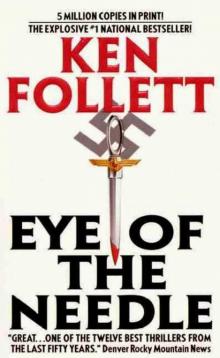 Eye Of The Needle
Eye Of The Needle Lie Down With Lions
Lie Down With Lions Winter of the World
Winter of the World Triple
Triple World Without End
World Without End Fall of Giants
Fall of Giants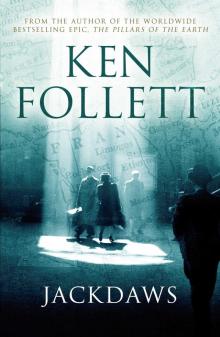 Jackdaws
Jackdaws Hornet Flight
Hornet Flight Whiteout
Whiteout A Dangerous Fortune
A Dangerous Fortune The Man From St. Petersburg
The Man From St. Petersburg A Column of Fire
A Column of Fire The Hammer of Eden
The Hammer of Eden On Wings of Eagles
On Wings of Eagles The Evening and the Morning
The Evening and the Morning The Key to Rebecca
The Key to Rebecca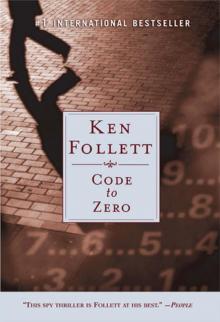 Code to Zero
Code to Zero Paper Money
Paper Money A Place Called Freedom
A Place Called Freedom The Modigliani Scandal
The Modigliani Scandal Triple (1991)
Triple (1991) A Dangerous Fortune (1994)
A Dangerous Fortune (1994) A Place Called Freedom (1995)
A Place Called Freedom (1995) Winter of the World (Century Trilogy 2)
Winter of the World (Century Trilogy 2)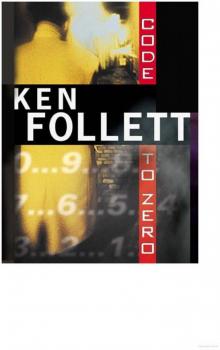 Code to Zero (2000)
Code to Zero (2000) On Wings Of Eagles (1990)
On Wings Of Eagles (1990) Storm Island
Storm Island Fall of Giants (The Century Trilogy)
Fall of Giants (The Century Trilogy)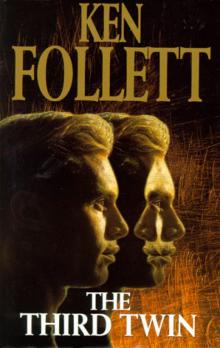 the Third Twin (1996)
the Third Twin (1996)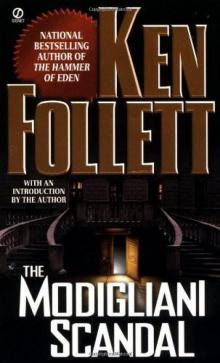 The Modigliani Scandal (1976)
The Modigliani Scandal (1976) Night Over Water
Night Over Water